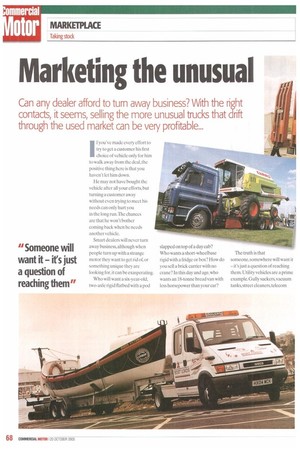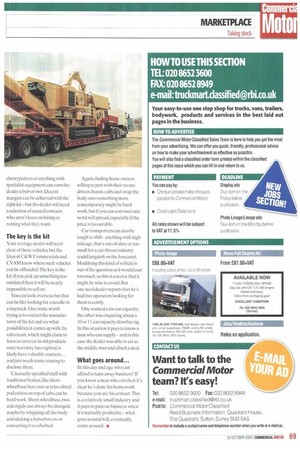Marketing the unusual
Page 74

Page 75

If you've noticed an error in this article please click here to report it so we can fix it.
Can any dealer afford to turn away business? With the right contacts, it seems, selling the more unusual trucks that drift through the used market can be very profitable...
If you've made every effort to try to get a customer his first choice of vehicle only for him to walk away from the deal, the positive thing here is that you haven't let him down.
He may not have bought the vehicle after all your efforts, but turning a customer away without even trying to meet his needs can only hurt you in the long run.The chances are that he won't bother coming back when he needs another vehicle.
Smart dealers will never turn away business, although when people turn up with a strange motor they want to get rid of, or something unique they are looking for, it can be exasperating.
Who will want a six-year-old, two-axle rigid flatbed with a pod slapped on top of a day cab? Who wants a short-wheelbase rigid with a fridge or box? How do you sell a brick carrier with no crane? In this day and age, who wants an 18-tonne bread van with less horsepower than your car? The truth is that someone, somewhere will want it —it's just a question of reaching them. Utility vehicles are a prime example. Gully suckers,vacuum tanks, street cleaners,telecom cherrypickers or anything with specialist equipment can earn the dealer a bob or two, Decent margins can be achieved with the right kit — but the dealer will need a selection of council contacts who aren't keen on hiring or renting what they want.
The key is the kit
Your average dealer will steer clear of these vehicles, but the likes of C&W Commercials and CVAM know where such vehicles can be offloaded .The key is the kit: if you pick up something too outdated then it will be nearly impossible to sell on.
You can look overseas but that can be like looking for a needle in a haystack. One route worth trying is to contact the manufacturer of the kit and see what possibilities it comes up with. Its sales team, which might claim to have no interest in old products once warranty has expired, is likely have valuable contacts... and just needs some coaxing to disclose them.
Unusually specified stuff with traditional bodies, like shortwheelbase box vans or retro-fitted pod cabins on top of cabs, can be hard work Short-wheelbase, twoaxle rigids can always be changed, maybe by whipping off the body and sticking a horsebox on, or converting it to a flatbed. Again, finding horse owners willing to part with their steamdriven chassis-cabs and swap the body onto something more contemporary might be hard work, but if you can convince one, word will spread, especially if the price is favourable.
Car transporters can also be tough to shift— anything with high mileage, that's out-of-date or too small for a cut-throat industry could languish on the forecourt. Modifying this kind of vehicle is out of the question as it would cost too much, so this is a sector that it might be wise to avoid. Rut one used dealer reports that he's had two operators looking for them recently.
One wanted a six-car capacity: the other was enquiring about a 10 or 11-car capacity drawbar rig. In this situation it pays to know a man who can supply— and in this case the dealer was able to act as the middle man and clinch a deal.
What goes around...
In this day and age who can afford to turn away business? If you know a man who can then it's clear he's done his homework because you are his contact:This is a relatively small industry and it pays to pass on business when it's mutually profitable — what goes around will, eventually, come around. •










































































































































































































